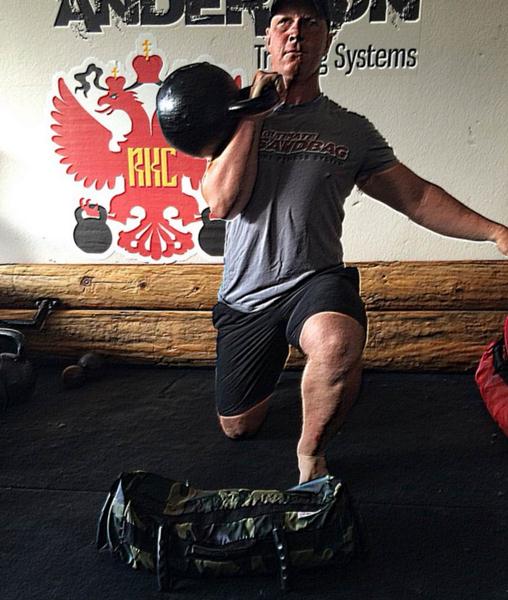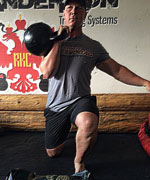The Nixon Test
By Troy Anderson, RKC Instructor, and DVRT Master Instructor

Who is one, if not
THE most notorious cheater in American history? None other than good ol’ "I’m not a crook" Tricky Dick Nixon.
Cheating in fitness isn’t tantamount to the leader of the free world trying to rig an election, but there sure is some cheatin’ goin’ on! And it’s happening at an alarming rate with one of the few real gold standards—the overhead press.
I think there is nothing more pure, powerful, beautiful, and valuable than achieving an overhead press with the equivalent of your body weight. It is a true indicator of great strength, bar none. But, as with many things, where there is value, there is cheating.
The purpose of this article isn’t to point fingers at cheaters; I don’t believe they are being intentionally malicious or misleading in any way. But, some things just aren’t quite what they seem. On the internet, cheating the overhead press usually starts when someone says, "I know it’s not pretty, but…" I know you really want to get that press, but you shouldn’t look like the world’s largest salamander while attempting it or have the shoulder position of a 5 year old trying to take off a hoodie for the first time.
Today I want to share a cool challenge that will help all of us improve our presses while having fun—and not looking like a salamander.
I present the
Nixon Test:
The focus of the Nixon Test is really quite simple:
1) Restore the value to overhead pressing.
2) ACCURATELY assess our overhead press.
3) Provide levels that will allow everyone to participate.
The first place the Nixon Test will help is by taking the emphasis away from the straight linear load model, and putting it on the ability to press with FULL integrity.
Since the emphasis will be on the INTEGRITY of the movement, we will need to combine a load-based approach, a body position approach, and a little basic math to figure out if we can meet the gold standard body weight overhead press.
If your test results don’t indicate that you should even attempt a body weight press that’s ok too. Later I will give you an application anyone can use.
The Tools:
You’ll need either
kettlebells or
Ultimate Sandbags for the following two reasons:
1) They are both super accessible tools that almost anyone can obtain.
2) They are probably two of the best designed tools which allow the participant use good technique by default.
A Look at Integrity…
Since we are chasing integrity not maximum load, we will need to keep our load constant. Our repetitions will increase as we reduce the complexity of our body position—this idea comes directly from the
DVRT 101 manual!
Here’s what happens during the
Nixon Test:
Sequence 1: Half Kneeling Press x 1 rep
either position
Sequence 2: Sprinter Press x 1 reps in
each position
Sequence 3: Military Press (feet together—touching) x 3 reps in each position
Sequence 4: Standard Standing Press (normal stance) x 4 reps
Transition directly from one sequence to the next without rest.
The Nixon Test with Ultimate Sandbag:
The Nixon Test with Kettlebells:
**Note** Obviously if you really want to go for integrity, you’ll want to press from both positions in sequence 1.
At the end of the test you will have 10 reps, a 10RM.
Which brings us to the math…
When I was writing this article, I knew I wanted to give you a way to measure overhead pressing strength while maintaining the integrity of the technique without having to chase maximum loads.
I remembered an article that broke down different RM’s using a coefficient to predict a 1RM. In my archive I found the answer in an article by Dennis B. Weis, the "Yukon Hercules" from Ketchikan, Alaska and the co-author of three books:
Mass!,
Raw Muscle, and his newest release,
Anabolic Muscle Mass.
His coefficient for finding a 1RM from a 10 RM is: 10RM Test Weight x 1.33
He also allows for a +/- 5% margin with the answer. I believe that using an unstable implement or independently moving implements like kettlebells—PLUS the changing body positions also allow us a +/-5% margin for the Nixon Test.
Our Formula:
10RM Test Weight x 1.33 = 1RM
1RM + (1RM x 5%) = ___________. If this number is equal to or greater your body weight, then you win!
Example:
A 200lb man takes the test with double with
32kg kettlebells, a test weight of approximately 140lb (I rounded down).
140 x 1.33 = 186.2
186.2 + (186.3 x .05) = 195.51 Nixon Test
So, he was very close to a body weight press, but more importantly he is able to press with integrity from multiple functional body positions.
Uses of the Nixon Test:
1) You can use it for percentage-based training
2) You can detect any integrity leaks in the various body positions—and it is also an opportunity to work on weak links.
3) You can use the information to pursue the gold standard body weight overhead press.
4) You can use it as a fun test or challenge to observe how the other components of your training program(s) effect your overhead press ability.
I think the Nixon Test is the best of both worlds—pure overhead strength and the ability to perform from multiple body positions. These various body positions are REALLY important. If you find a "leak" in one of those positions, you just won’t be able to complete the press or your cheating will be so ridiculous that it can’t be ignored.
Purists will say that the Nixon Test can’t give you a true 1RM number. However, most can agree that the Nixon Test is a very accessible and reasonable test for assessing our all-around pressing strength.
If we move towards an integrity-based strength model, I’d like to suggest that there’s no better combination for testing this than a load-based and functional body position model. And that exactly describes the Nixon Test.
Stay Humble.
 Troy M Anderson, RKC Instructor, DVRT Master Instructor is a farm kid driven to spread the good word of the ACCESSIBILITY of kettlebells, sandbags, bodyweight training, and UN-Apologetic Living. His website, Alpha Kettlebell also features many kettlebell workouts: https://alphakettlebell.leadpages.net/kbwod/
Troy M Anderson, RKC Instructor, DVRT Master Instructor is a farm kid driven to spread the good word of the ACCESSIBILITY of kettlebells, sandbags, bodyweight training, and UN-Apologetic Living. His website, Alpha Kettlebell also features many kettlebell workouts: https://alphakettlebell.leadpages.net/kbwod/
Back